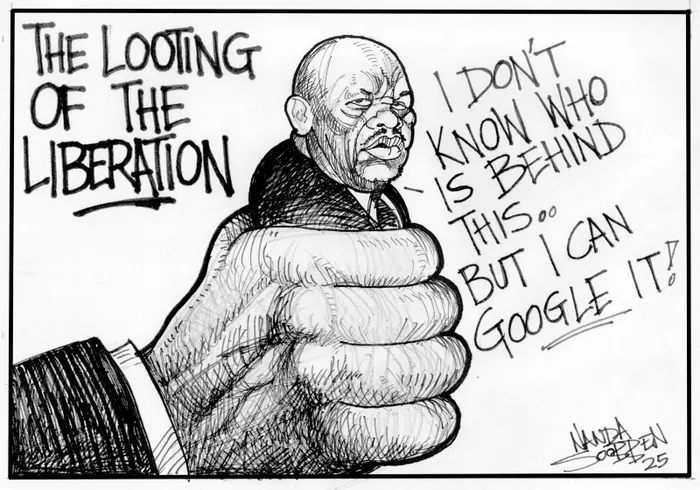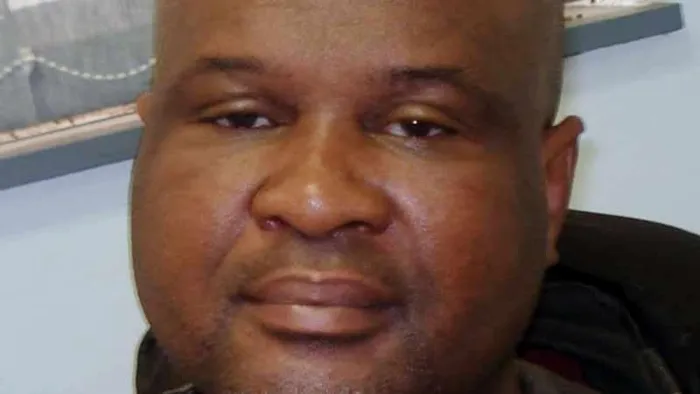
If KZN's Police Commissioner, Lieutenant-General Nhlanhla Mkhwanazi’s claims and the Zondo Commission of Inquiry’s report are anything to go by, South Africa should be declared a crime scene, writes Zakhele Collison Ndlovu.
Image: Nanda Soobben
IF KWAZULU-NATAL Police Commissioner, Lieutenant-General Nhlanhla Mkhwanazi’s claims and the Zondo Commission of Inquiry’s report are anything to go by, South Africa should be declared a crime scene. Our corrupt leaders and the adult citizens who vote for them have each played a role in turning our beloved country into a crime scene.
President Cyril Ramaphosa established the Madlanga Commission of Inquiry after Mkhwanazi made shocking claims and accused the Minister of Police, Senzo Mchunu, and the now-suspended deputy national Commissioner of Police, Shadrack Sibiya, of interfering in high-profile investigations and protecting criminal networks.
However, South Africans should not be shocked after we have had leaders like Jacob Zuma, who shamelessly said that “if I go down, then I won’t go down alone.”
Suffice it to say that Zuma has successfully used delaying tactics to avoid going on trial over corruption and bribery charges related to the arms deal.
Mkhwanazi’s claims have the potential to expose the extent of the rot in democratic South Africa. Furthermore, his claims are likely to unmask the weaknesses and the ineffectiveness of oversight institutions such as Parliament and the Office of the Public Protector in holding the executive branch accountable.
What this means is that South Africa’s separation of powers or system of checks and balances is not working in preventing the abuse of power and containing rampant corruption in the public sector.
While it is still early days to verify the veracity of Mkhwanazi’s claims, what cannot be denied is that post-apartheid politics are based on normalising wrongdoing, unaccountability, and a culture that deliberately overlooks the widespread rot in the public sector.
Mkhwanazi’s claims have laid bare why South Africa’s crime rate is one of the highest in the world, and its crime rate has remained stubbornly high in recent decades. He cites obvious weaknesses in the criminal justice system, such as police corruption, sheer incompetence, lack of resources, and political interference, as some of the reasons.
If Mkhwanazi’s allegations are anything to go by, South African leaders, such as presidents, judges, and prosecutors, are Cosa Nostra. This means South Africa is, to all intents and purposes, a Mafia state whose government masquerades as a government of the people, for the people, and by the people. Meanwhile, citizens live in constant fear of brazen criminality such as extortion, robberies, political killings, construction mafia, and gang violence.
In his testimony at the Madlanga Commission and before Parliament’s ad hoc committee on police, Mkhwanazi insinuates that there is no political will to fight and contain crime. He goes further to allege that those entrusted with fighting crime are either in cahoots with criminals or they themselves are criminals.
Let us take Mkhwanazi’s claim that the decision to disband the Political Killing Task Team (PKTT) was an attempt to protect criminals. How would Mchunu get away with taking a unilateral decision to disband the PKTT without consulting with the national Police commissioner, Fanie Masemola? Where was Ramaphosa?
If the Madlanga Commission of Inquiry and Parliament’s ad hoc committee find that there is merit in Mkhwanazi’s claims, then this means that Mchunu and Sibiya would be guilty of defeating the ends of justice, amongst other things.
Mkhwanazi also implicated the former Minister of Police, Nathi Mthethwa, accusing him of political interference in the Richard Mdluli case, a former head of Crime Intelligence. Mthethwa, South Africa’s ambassador to France, reportedly committed suicide days later. What is not clear is why Mthethwa committed suicide.
While Mkhwanazi’s claims are focused on the rot within the criminal justice system, it appears that the rot actually extends to and permeates every state institution. For example, one wonders how Ramaphosa, who brought the intelligence services under the Presidency, would not be aware of Mchunu’s wrongdoing. Would this then be a case of the fish rotting from the head?
Mkhwanazi first dropped the bombshell in early July this year that Mchunu, alongside Sibiya, was in cahoots with criminal syndicates. Lest we forget, Mchunu is a close ally of Ramaphosa. Ramaphosa has a cloud hanging over his head in regard to the Phala Phala farm scandal. Mkwanazi has raised troubling concerns about Mchunu’s involvement in classifying as "top secret" the Independent Police Investigative Directorate (IPID) report on the Phala Phala scandal, which was completed in October 2023.
In this context, it would be a travesty of justice if Ramaphosa does not appear before the Madlanga commission of Inquiry and Parliament’s ad hoc.
Ramaphosa is not the first Head of State to be seen protecting his compromised ally. President Thabo Mbeki also appeared to protect Jackie Selebi, a disgraced national Commissioner of Police who famously told the nation on national television that he was “friends with Glen Agliotti” a well-known drug-lord. Mbeki subsequently appointed the Frene Ginwala Commission of Inquiry to look into the fitness of Vusi Pikoli to hold the office of the National Director of Public Prosecutions (NDPP).
Pikoli’s crime was to go after Selebi, who happened to be Mbeki’s trusted and closest ally. It would appear that post-apartheid presidents are either sleeping on the job or are benefiting from criminal activity.
Let us also keep in mind that Jacob Zuma had a cloud hanging over his head and was implicated in the arms deal scandal, the Thuli Madonsela Public Protector’s report, and the Zondo Commission of Inquiry. Appearing before the Madlanga Commission and the ad hoc committee, Mkhwanazi warned that South Africa is “unable to search goods coming into the country” because “we have one scanner in the inbound containers. This would explain how drugs and illicit goods keep entering the country without being detected. Mkhwanazi was at pains reminding Parliamentarians that “we flagged syndicates compromising police work” without any action being taken.
Answering questions from MPs, Mkhwanazi warned that elements of the judiciary, prosecutions, correctional services, and even the media have also been compromised and captured. He referred to a chart included in his submission showing what he called the "Big Five" suspects that are at the centre of a major corruption and organised crime investigation. He identified the notorious Vusi "Cat" Matlala and Katiso Molefe, both currently facing trial, as two of the "Big Five".
Besides the drug cartels, Mkhwanazi also identified tenderpreneurs, a euphemism for people who benefit from government contracts, as some of the culprits who are corrupting or capturing elected representatives, career bureaucrats, and those in the criminal justice system.
Even before the Madlanga Commission and the ad hoc can finish their investigations, South Africans appear tempted to believe Mkhwanazi’s claims after years of ANC misrule. Just think about Bheki Cele, who was dismissed as the national police commissioner for wrongdoing. Then Cele resurfaces as the deputy minister of agriculture after Zuma appointed him, and subsequently as the minister of police after Ramaphosa appointed him.
What does all this mean as South Africans prepare to vote in next year’s local government elections? While South Africans appear to be fed up with the ANC, it is not clear which political parties stand to benefit from the ANC’s loss of electoral support. In last year’s General elections, the MK Party was the main beneficiary.
The problem with South African voters is that they vote out of emotion, and many blacks are still stuck in the politics of the "liberation" struggle.

Zakhele Collison Ndlovu
Image: File
Zakhele Collison Ndlovu is a political analyst at the University of KwaZulu-Natal.
** The views expressed do not necessarily reflect the views of IOL or Independent Media.
Related Topics: